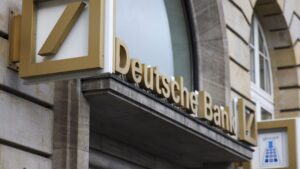Deutsche Bank’s Q1 Performance: A Beacon Amidst Economic Headwinds
In an era where financial stability is paramount, Deutsche Bank AG has recently unveiled its first-quarter results, showcasing a robust profit surge attributed to strong performance across its investment banking segment. As Germany’s largest lender, the results may offer a glimmer of hope, not just for the bank itself but for the broader European economy as well.
Financial Highlights
For the first quarter of 2023, Deutsche Bank reported a net profit attributable to shareholders of €1.775 billion (approximately $2.019 billion), marking a remarkable 39% year-on-year increase. Analysts had anticipated a profit of around €1.64 billion. In stark comparison, the previous quarter’s profit stood at a mere €106 million, signaling a significant turnaround.
Revenue for the same period reached €8.524 billion, which is a 10% increase from the previous year, outperforming a previous quarter’s result of €7.224 billion. CEO Christian Sewing proudly stated that these results not only reflect the bank’s ongoing commitment to its strategic goals for 2025 but also represent its best quarterly profit in fourteen years.
Key Operational Insights
- Profit Before Tax: Reached €2.837 billion, a striking 39% rise YoY.
- Capital Ratio: The CET1 capital ratio, a key measure of bank solvency, remained stable at 13.8%.
- Return on Tangible Equity (ROTE): The bank achieved an ROTE of 11.9%, surpassing its 2025 target of 10%.
One area of concern has been the provision for credit losses, which climbed to €471 million, up from €420 million in the fourth quarter. This increase reflects uncertainties in the geopolitical landscape, particularly influenced by U.S. trade policies.
Investment Banking Resilience
Deutsche Bank’s investment banking division displayed continued strength, with net revenues reaching €3.4 billion—a 10% increase compared to the prior year. Notably, the fixed income and currencies (FIC) unit experienced a remarkable 17% growth, although a decline of 8% in origination and advisory services tempered the total.
Asset management revenues also rose by 18%, totaling €730 million. This diversification strategy has been pivotal, especially as dwindling loan profits become common due to shifting interest rates.
Navigating Policy Changes
The German banking landscape is undergoing transformative political shifts, particularly under the potential leadership of Friedrich Merz from the Christian Democratic Union. As Berlin initiates reforms in its fiscal policies with an increased focus on defense spending, the expectation of enhanced regional investment could boost market confidence. Deutsche Bank’s CFO, James von Moltke, addressed this, stating that they had hedged "almost all" of their interest rate risk for the coming year, signaling preparedness amid the uncertainty.
Wider Implications of U.S. Trade Policies
Current U.S. tariff policies continue to cast a shadow over the European banking sector. Deutsche Bank is working through the implications of a 20% tariff on EU goods, reduced to 10% until mid-July to facilitate negotiations. Despite the uncertainties, this environment has unexpectedly benefitted the bank’s FIC trading operations.
Conclusion: A Roadmap for the Future
At Extreme Investor Network, we believe these developments at Deutsche Bank are telling of a broader trend in European finance. As political climates stabilize and fiscal reforms take shape, opportunities for growth and increased investor confidence arise. With a forward-thinking strategy focusing on investment banking and market adaptability, Deutsche Bank not only showcases resilience but may also serve as a leading example for European banks navigating similar challenges.
As we keep an eye on the eurozone’s shifting economic landscape, Deutsche Bank’s first-quarter performance underscores the necessity for agility and proactive financial strategies in today’s complex market landscape. Stay tuned for more insights and updates as we explore how these dynamics unfold in our upcoming analyses.
At Extreme Investor Network, we are dedicated to bringing you in-depth analyses and up-to-date insights on financial markets and investment opportunities. Subscribe to our newsletter for regular updates!

